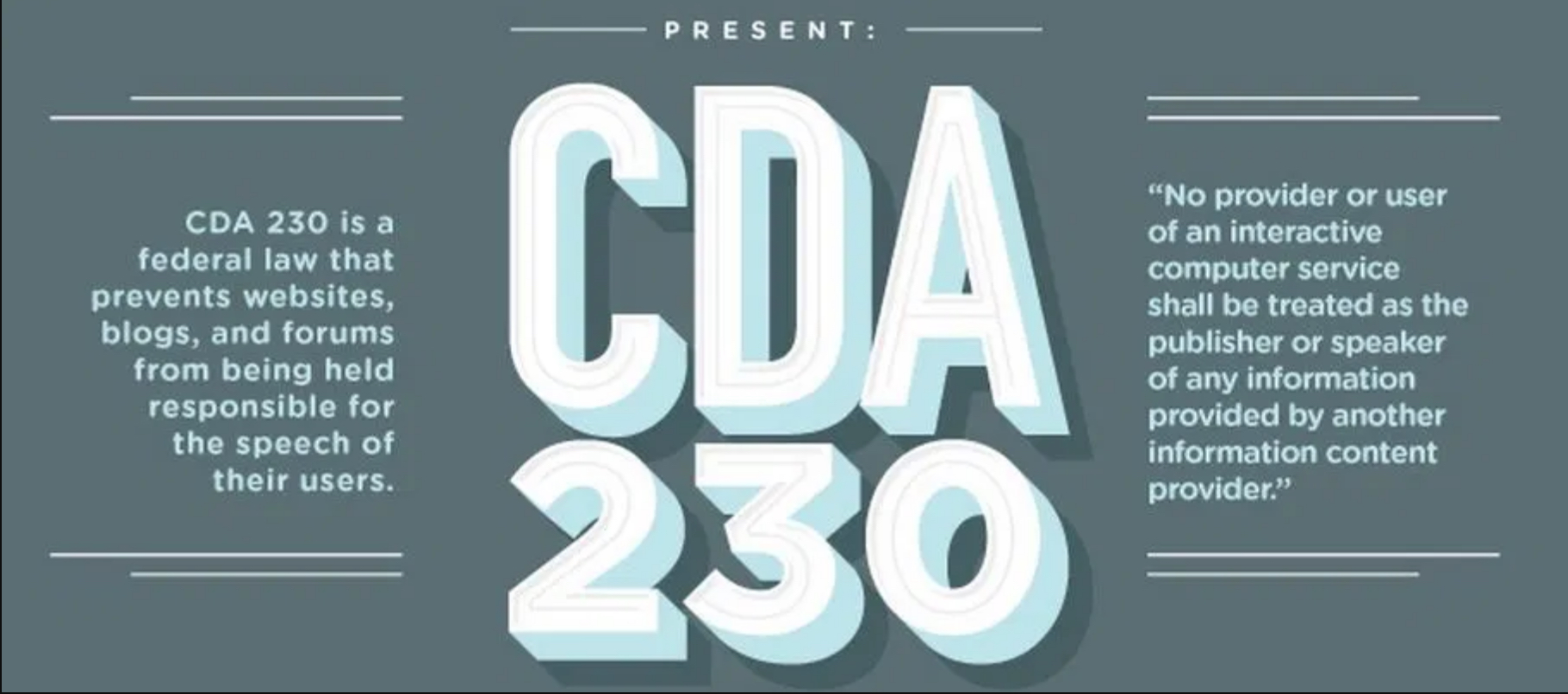Section 230 and Big Tech
Gallery

March 25: the CEOs of all three tech giants--Facebook, Google, and Twitter- appeared in front of Congress in a virtual hearing, part of the ongoing debate over Section 230 and Internet communication regulations. While this isn’t the first time the CEOs testified to Congress, it is the first time since a group of Trump supporters stormed the Capitol on Jan. 6. Lawmakers from both sides of the aisle are concerned with Section 230 and the role of Big Tech.
Section 230 of the Communication Decency Act passed in 1996, is often referred to as the 26 words that built the modern internet. Section 230 reads:
“No provider or user of an interactive computer service shall be treated as the publisher or speaker of any information provided by another information content provider.”
Section 230 gives immunity to social media platforms from any sort of liability on user content. Under this law, companies like Facebook, Twitter, Youtube, and even 4chan which has been cited for promoting extremism can’t be sued for content or activity on their site regardless of how harmful.
Lawmakers, particularly Democrats, are concerned about the spread of misinformation and harmful content. Since the capitol riot, this concern has deemed to be more urgent than ever as many of the rioters were influenced by misinformation hosted on sites like Twitter and Parlor. Last month, several Democratic lawmakers including Amy Klobuchar introduced the SAFE TECH Act that aims to “reaffirm civil rights, victims’ rights, and consumer protections.” Among many amendments, this bill would allow a pathway for users to sue the company for harassment, discrimination, or other forms of abuse.
President Biden has long expressed his opposition to the immunity Section 230 provides to Big Tech companies. “Section 230 should be revoked, immediately should be revoked, number one. For Zuckerberg and other platforms,” he said in an interview with the New York Times earlier this year.
Most Republicans, on the other hand, have different concerns regarding Section 230 that comes under the Civil Liability section:
“Any action voluntarily taken in good faith to restrict access to or availability of material that the provider or user considers to be obscene, lewd, lascivious, filthy, excessively violent, harassing, or otherwise objectionable, whether or not such material is constitutionally protected.”
Under Section 230, companies can moderate content as they see fit. Republicans accuse social media platforms of silencing conservative voices under this shield. Last year, three top Republican lawmakers, including Judiciary Committee Chairman Lindsey Graham introduced the Online Freedom and Viewpoint Diversity act, which seeks to revise Section 230. One of the suggested modifications includes removing “otherwise objectionable” and replacing it with concrete terms such as “promoting terrorism” or “unlawful.”
Former President Donald J. Trump signed an executive order in May 2020 urging the Federal Communications Commission (FCC) to set new rules on the protections that websites can get under Section 230.
Former FCC Chairman Ajit Pai, and Trump appointee, who resigned earlier this year, recognizes the bipartisan support to reform section 230 and clarify ambiguities. The FCC has the legal authority to interpret section 230 under the Communications Act. In an October 2020 statement, Pai stated, “Social media companies have a right to free speech. But they do not have a first amendment right to immunity denied to other media outlets such as newspapers and broadcasters.”
President Biden’s newly appointed FCC chairwoman, Jessica Roseworcel, however, has a different stance on the matter. In a 2020 statement in response to a White House petition filed on behalf of the Trump Administration to rewrite Section 230, accusing social media platforms of censorship against conservative and right-wing views. Roseworcel stated the FCC is not the “president’s speech police'' and the FCC ``needs to reject this effort to deploy the federal government against free expression online. In fact, if we honor the Constitution, we will do so immediately.”
There are numerous concerns and complaints about the loopholes in Section 230. One of the biggest of them being whether or not companies like Facebook and Reddit work in good faith. Critics argue that it is impractical to rely on these companies when their primary motivation is profit; we’ve seen harmful content passing through the algorithm and becoming viral. Former FCC chairman Ajit Pai in a 2017 interview with PBS NewsHour noted the concern, “ We don’t put faith in any single or particular sector of the economy.” Pai went on to say, “We put our faith in the rule of law,” and he stressed that rule of law must be “faithfully administered.”
Some lawmakers worry that revoking or reinterpreting Section 230 will limit freedom of speech. When companies are held liable for the content on their platform, they can restrict what the users post. Independent Journalist Kim Iversen says a solution to this could be redefining the Internet as a public utility and bringing these companies under the same FCC regulations that apply to phone service companies such as Verizon and AT&T.
The bipartisan interest in Section 230 implies that reform is critical. However, it will come once and if lawmakers can agree on what and how the new Internet should look like.
